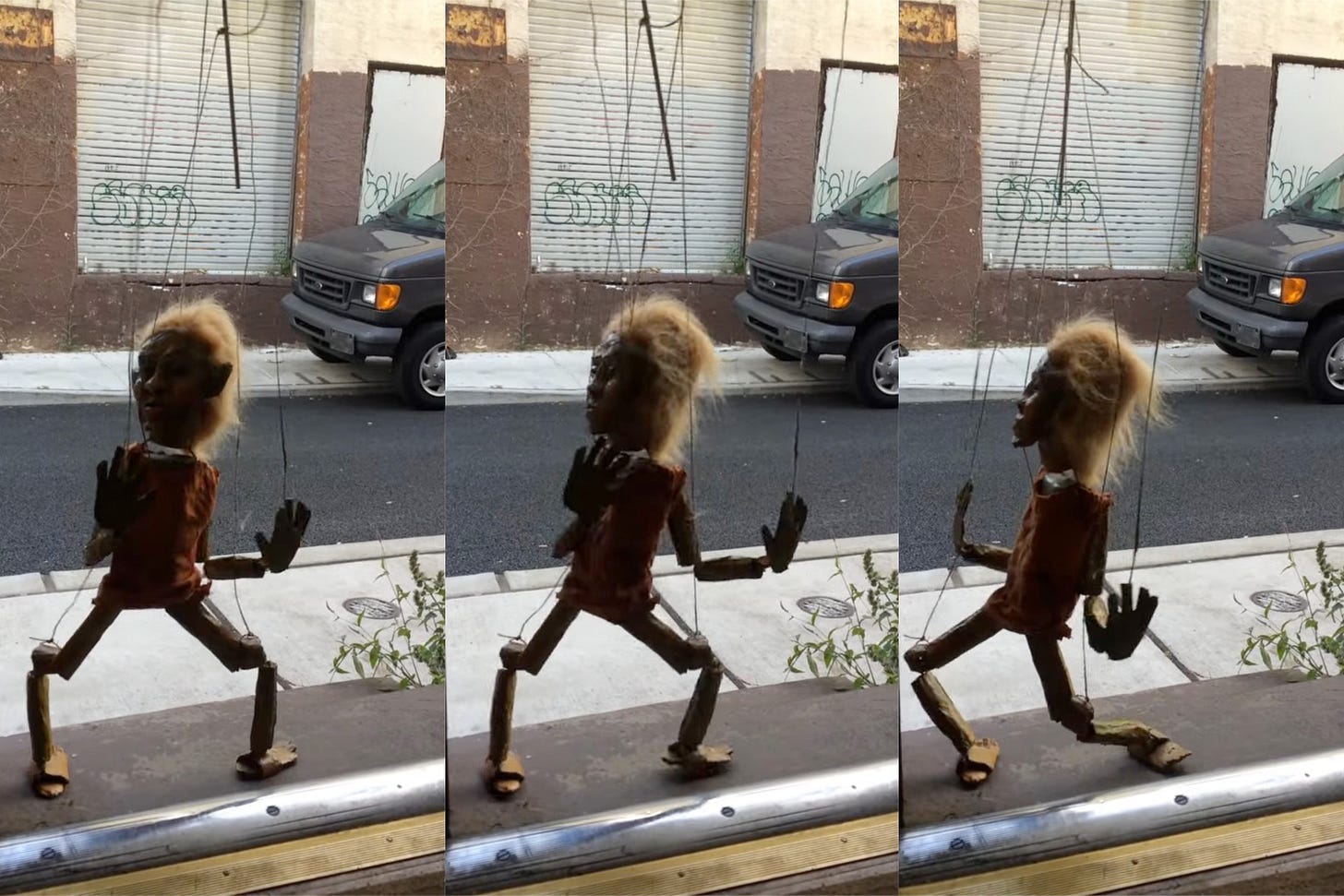To longtime subscribers, perhaps you’ve noticed that welktober has shifted from art coverage to an outlet for improvised fiction and whatever else I feel like writing about (which will include art!).
Here is a piece of flash fiction that I decided to withdraw from my forthcoming collection since it is markedly different from the other stories. It was inspired by the song “Hope” by Alex G and written while I was on a night shift at a steel plant in Gary, Indiana.

Hope
“You won’t have to write a thing about me. Not in this room or anywhere.”
That’s what he said as I tapped at the keyboard and thought he was asleep. Maybe he never even said it, but that was the implicit announcement each time he stumbled back into our basement cellar and laid there a while in his bright-red raincoat, body still buzzing from whatever.
And then he was awake, rubbing my shoulders, squinting over my head at the laptop.
“Is life perfect there?”
“Not yet.”
He clapped my shoulders twice and clamoured up the stairs towards the strip of daylight beckoning from beneath the door, muttering about Paul’s bookstore. 7 hours passed. I napped, did up my hair, made ramen, coffee, returned to the desk. At 20 hours, I texted Paul—everything good? At 50 hours, I reminded myself that he often disappeared for twice as long, always to come stumbling back down the stairs. I continued working under the lamplight. At 64 hours, a dull knock on the cellar door and the misty-eyed police chief saying that James was dead, OD’d, and Paul disappeared, we found James in the back room of the bookstore.
I had little reason to be shocked, but there was enough of it circulating for my knees to buckle and my stomach to reject its contents, now a pathetic blob on the door mat. The chief carried my ninety-pound body down the stairs and plopped me onto the musty bed, which seemed nothing more than a swarm of pixels. I could not associate it with the mental image one has of a bed. Five or forty-five minutes passed that way.
“What happens now.”
“Huh?” The chief stared at the floor, despondent, perhaps having also forgotten how to categorize the objects strewn across it.
“An investigation? Find Paul? Is Paul a suspect? Or anyone?”
“Sure. Paul and you and the mayor and this whole neighbourhood.”
He was not dead yet; he was laid up in bed, sweating through the sheets.
“Who deserves a life. You practice for it and I use it all up,” he said. His eyes were shut, his breathing hardly audible. I tipped a glass of water on his face.
“Let me rest.” He tried to wipe away the water but his palm landed on the pillow.
“If your heart stops, does that makes me a criminal? Negligence, or something.”
“Can’t you just say you don’t want me to die?”
He probably couldn’t feel my arms wrapped around his chest and my legs around his hips, prepared at any moment to squeeze him back to life. I listened to his heartbeats like molasses through the crook of my elbow and somehow still felt certain that he was our lifeline.
The companies abandoned the steel mills and left us to wither. Just like our friends who go away, it’s nothing personal. We’re all trying to leave by one method or another; it’s bad business to stick around. Our bodies are all scarred up from appendages constantly falling off. You add them to the list and wonder why anyone keeps track. You document lives with the hope that they can prevail beyond their wretched conclusions but recognize the documents for what they are: bad poems and surface sketches, caricatures and insults.
You wonder if you’d be better off with a little more living.
Following the funeral was a celebration of life at the old BOP shop. The innards were gutted years ago, leaving a metal shell stained grey from smelting smog. A dusty hangar for tangled piping and defunct instruments. We tried to do them justice. We danced on the tinny, slanted roof and cascaded bottles onto the road like a waterfall. Margaux stumbled off the edge into a patch of dirt, which we called a sprained ankle since those don’t need a hospital. From every punched-out window in the building rang howls into the night, adults overrun by grief and the same chemicals that killed James and maybe Paul.
The neighbourhood pitched together to keep Paul’s bookstore afloat. We sat on piles of books and recalled James’ outsized existence, how the highs and lows of a single day outshone Mrs. Dalloway or anything else stacked upon those shelves. When some kids burned the building down, the mayor offered to install plaques with James’ and other deceased’s names in the foyer of the rehab clinic that would soon replace it. A bronze square, a blurb with a start and end date, was everything James never wished to be, but we reluctantly agreed. The mayor acted quickly—not on the plaques or clinics, though. It only took him three days to knock on my door about the coming election.
A month after the funeral, I took my journal down to the lake and flipped through the pages with my feet in the water.
June 4
I am typing one of those 3am epiphanies into my phone, down by the docks, when he pushes me into the lake. My phone sinks to the bottom and he yells, It’s all right here!, his arms spread open to the black void of Lake Michigan with a stripe of moonlight revealing the surface ripples, before diving in beside me, his bright-red raincoat inflating like a water balloon.
June 18
He swaggers down the stairs to our basement after a long one, spilling his drink at each step and I tell him, Go have a cigarette, idiot, snatching the bottle from his hand. He gives me a kiss and leaves the room obediently. I wake to him mopping the floor singing a song called Hope and on the bedside table is a hurriedly made, yet charming pencil sketch of me sleeping, a mug of hot tea resting on the page, the water stain spreading, soon to render the drawing obsolete.
July 22
We are making love or fighting, it’s all the same and I don’t even need to be there, he is self-fulfilling, all-over town are stains of his passion sucked and spit out like cherry pits.
August 5
I figured out what him and Paul are doing, those knuckleheads. James following a parking officer around and writing him fake tickets while he was illegally parked to write real ones; loitering at night on West 13th and when someone tried to mug him, he put a fake gun to his head and threatened to pull the trigger. Somehow, he came out of these unscathed, the parking official and the mugger found him hilarious all the same. They didn’t know Paul was filming the stunts with his shaky withdrawal hands. The videos got some traction with internet kids, probably watching from their parents’ brownstones in Lincoln Park. If the project doesn’t get him killed, maybe he’ll be the one who gets us out of this place.
I dog-eared the page of that last, semi-hopeful entry, but knew I wouldn’t be reopening it; the words were conjecture, figuration, invented glories, detached from a reality in which a soul slipped through a nation’s careless grasp and then mine. I took a deep breath and threw the notebook into the lake.
Back at the house, I stared at the Banker’s Box that contained most of his net worth. I took his bright-red raincoat off the doorknob it hung from. The torso went down to my knees, almost, so I balled up the midsection and secured it with a belt, folded back the sleeves, and zipped the zipper to the neck with the hood up. This had become my grieving process. I suppose because it made everything smell like him. My laptop, open upon the desk, had witnessed this behaviour—me pacing around the Banker’s Box in my raincoat-cocoon—most nights for the last month. Not once since the police chief came by had I touched the machine or thought about the novel on its hard drive that was three-quarters complete. 70,000 words, yet not a sentence cracking the code of an average pedestrian, let alone my extraordinary James. I flicked its nosy screen shut and followed him out the basement cellar door.



